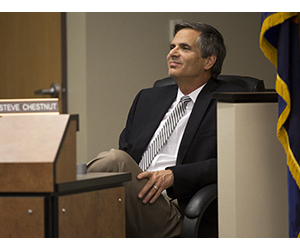
A community opinion survey of the Maricopa Unified School District finds 78 percent of respondents who send their children to district schools trust the teachers and principals.
The survey was commissioned by the Maricopa Economic Development Alliance and covers a variety of questions related to how the community perceives its schools. Tempe, Ariz.-based O’Neil Associates Inc. conducted the survey of more than 600 Maricopa residents.
Ioanna Morfessis, senior advisor to MEDA, said the issue of how Maricopa’s schools are perceived is important to the city’s economic development efforts.
The purpose of the poll was to develop a “baseline of understanding in terms of how K-12 public schools are perceived in the City of Maricopa,” stated a MEDA press release.
“The quality of K-12 education matters to MEDA because it is a foundational building block for creating a high-quality workforce, and to retaining and attracting highly educated and talented workers and job opportunities in the city of Maricopa,” the release states.
Morfessis said it is important to not “lose sight of one of the most important aspects of the community – its human capital. The K-12 school system develops that.”
She said Maricopa has a “great quality of life, great residential neighborhoods, outstanding education with the Central Arizona College and the K-12 schools. Maricopa has good healthcare that is expanding, recreational opportunities – all these things combine to create the business climate.”
MEDA is a public-private partnership that was established by the city in 2009 to bring together government, education and the civic sectors to “focus on the opportunity and issues that impact Maricopa’s economic development competitiveness,” she said.
“I was pleased that the survey said that two-thirds of parents trust their schools, teachers and administrators,” MUSD Superintendent Steve Chestnut said. “The survey also showed areas where our school district needs to improve, and we will continue to work on those issues.”
“I have prepared an action plan that addresses these improvement areas and we will continue to work on our goal of making the Maricopa Unified School District an ‘A’ rated district," Chestnut added.
Sixty-six percent of Maricopa residents polled, including those without school-age children, trust MUSD schools, teachers and administrators, the survey found.
Respondents “believe that the quality of the education available through MUSD schools in the last five years is either ‘about the same’ (44 percent) or improving (36 percent).”
Sixty percent of residents with children in MUSD are “satisfied” and 15 percent are “very satisfied” with the quality of the education their K-12 children are receiving, the survey found. Forty-nine percent of these parents “believe the education at MUSD schools is improving.”
Fifty-nine percent of the respondents in the survey are not parents, 19 percent are exclusively MUSD parents, 12 percent are non-MUSD parents, 4 percent have children in both MUSD and non-MUSD schools and 6 percent have children in non-MUSD public schools.
“Maricopa enjoys firm support for its public-school system from those residents with children attending MUSD public schools (24 percent of total residents),” the release stated. “It enjoys moderate support from residents who do not have school-aged children (59 percent of residents) and weak support from those who have elected to send their children to non-MUSD charter or private schools, or who home-school (18 percent).”
Eighty-eight percent of the respondents think it is “important” or “very important” to improve student achievement in the basics – science, math and reading. Eighty-three percent think increasing teachers’ salaries would be “important” or “very important” to reaching these goals.
***ADVERTISEMENT***Forty-one percent of parents who send their children to MUSD schools believe their children would receive a better education at a charter school.
“The percentage believing their child would get a better education at a charter school is 83 percent among parents who choose not to send their children to MUSD schools,” the release states.
“Despite the belief that charter schools will provide students with a better education, Maricopa residents see charter schools as only marginally better than public schools,” the release states. “When asked to ‘grade’ schools by type, survey respondents gave public schools across the nation a grade of ‘C,’ MUSD schools a ‘C,’ and charter schools a ‘C.’”
Morfessis said she thinks these “C” grades may reflect a national attitude about schools. Some respondents do not have children enrolled in schools.
As a result of the survey, MEDA is recommending the MUSD governing board consider placing an override proposal on the ballot to replace the charter funding that ends after the 2014-15 school year.

![Who’s the Best Mom InMaricopa? Nominate now! Marlene Marshall, Christina Olivares, and Meghan Bremer. [Bryan Mordt]](https://www.inmaricopa.com/wp-content/uploads/2023/05/BCM_8465-218x150.jpg)



![Maricopa sheds tears amid Maui wildfires that killed dozens For Maricopa resident Janelle Gomez, the sorrow mirrors the loss of a family member. [Brian Petersheim]](https://www.inmaricopa.com/wp-content/uploads/2023/08/Gomez-218x150.jpg)
![Embracing Freedom: Celebrating the Fourth of July Councilmember Vincent Manfredi at Great American 4th 2021 [Victor Moreno]](https://www.inmaricopa.com/wp-content/uploads/2023/07/2021-Great-American-4th-e1688414543522-218x150.jpg)





![Alleged car thief released without charges Phoenix police stop a stolen vehicle on April 20, 2024. [Facebook]](https://www.inmaricopa.com/wp-content/uploads/2024/04/IMG_5040-218x150.jpg)

![3 things to know about the new city budget Vice Mayor Amber Liermann and Councilmember Eric Goettl review parts of the city's 2024 operational budget with Mayor Nancy Smith on April 24, 2024. [Monica D. Spencer]](https://www.inmaricopa.com/wp-content/uploads/2024/04/spencer-042424-preliminary-budget-meeting-web-100x70.jpg)


